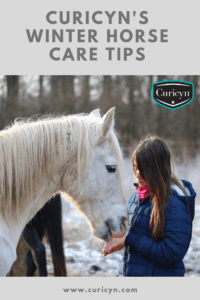8 Winter Horse Care Tips

Horses often prefer and are better off outside during cold weather except in harsh or severe winter conditions. With that said, owners do need to provide amenities to protect their horses and keep them healthy during the winter months. Here are Curicyn’s winter horse care tips.
Winter Horse Care Tip 1: Increase calorie intake
The average horse needs to consume about 2% of their body weight per day except during cold winter weather. During the winter, grass often stops growing and nutritional quality decreases. In addition, horses use significantly more calories to keep warm in the winter. High-quality hay is vital for their winter diet, especially for horses that are turned out a lot. Take into account that cold weather can also slow the growth of smaller and young horses. More of their calories are going toward keeping them warm rather than to promote weight gain. With this in mind, increase hay and concentrates, and always feed your younger, smaller horses a little more.
Winter Horse Care Tip 2: Increase water & salt intake
During the summer, a large percentage of your horses’ water intake comes from the lush pastures they graze on. But, during the winter that doesn’t happen. Therefore, it is vital to provide plenty of drinking water during the winter months. And don’t expect your horse to get the actual amount of water he needs from snow. To encourage your horse to drink more there are a few things you can do. To begin with, keep their water clean and in a place where it will not freeze. Next, research shows that horses prefer to drink warmer water during the winter, so keep the water slightly warm. Finally, provide free access to a trace mineral salt block or supplement their feed with a small amount of salt. The salt will boost their desire to drink more.
Winter Horse Care Tip 3: Deworm your horse
After the first freeze deworm your horse with a product such as Ivermectin. It will kill external parasites, such as lice, mites, ticks, etc. Continue a regular deworming program throughout the winter months to keep your horse healthy.
Winter Horse Care Tip 4: Provide proper grooming & hoof care
A horses’ thick winter coat can hold moisture and take a long time to dry. Once the horse is dry, fluffing up his hair will increase the insulating efficiency of his coat. Even though their hooves grow slower in the winter, they should still be trimmed every 6 to 12 weeks. It is also important to pick your horse’s hooves daily during the winter. Any ice chunks need to be removed and lacerations caused by ice or other material need to be treated. If hoof problems do occur, Curicyn’s Hoof Care Kit is the perfect solution. With the kit, you can soak the injured hoof in a molded hoof pad with Curicyn Original Formula which reduces inflammation and promotes healing. Any lacerations can be treated with Curicyn’s Original Formula Spray.
Winter Horse Care Tip 5: Protect your horse from mud & ice
During winter months, mud can be a problem around feeders, waterers, and gates. Remove excess mud from your horse’s legs on a regular basis. This will help in preventing any fungal and bacterial infections. If an infection does happen, Curicyn’s Original Formula Spray can be applied 3 times a day to help reduce any inflammation and promote healing.
Ice can also lead to serious injuries. Monitor areas prone to ice. Sand can increase traction on ice and salt can speed the melting process, but don’t use these together. Your horse could accidentally ingest sand while trying to lick the salt. If possible, fence areas off that may cause a continuous problem.
Winter Horse Care Tip 6: Provide adequate shelter
Trees and low places will act as wind barriers and can provide some protection. A three-sided structure will provide shelter while still allowing for your horse’s natural behavior. University of Minnesota Extension (2018) research found that horses housed outdoors tend to use the shelters very little except in breezy conditions during snow and rain. It is the wind and moisture that are difficult for them to tolerate.
Winter Horse Care Tip 7: Provide blankets if needed
Your horse’s coat is a natural blanket and thickens as the days become shorter. It’s recommended to not blanket your horse before December 22 or you will decrease your horses’ natural winter coat. The hair insulates and keeps the horse warm. As expected, the thicker the hair, the warmer the horse. Blankets are often used for horses that do not grow a thick winter coat, has had its winter coat clipped, or for horses that do not have adequate shelter. Blankets should only be used on clean, dry horses and should fit. Horses out in the elements should wear waterproof and breathable turnout rugs. A horse in the elements, in a non-waterproof, saturated, blanket could quickly become cold. Remove and change the blankets on a regular basis and as weather changes.
If your horse is wearing blankets, check them regularly for rubs and sores. If rubs and sores do appear, Curicyn’s Original Formula Spray can be applied 3 times a day to reduce any inflammation and promote healing.
Winter Horse Care Tip 8: Exercise your horse
During winter months your horse needs to exercise as often as possible. Avoid taking your horse through heavy snow unless they are physically fit. Otherwise, they may suffer tendon injuries. Allow your horse to properly cool down after exercise. Leaving a wet, sweaty horse to cool down in a cold barn can lead to illness. Also, make sure your horse has time to dry out before turning them out after a ride.
In conclusion, Curicyn’s winter horse care tips should benefit both you and your horse and Curicyn’s Hoof Care Kit and Curicyn’s Original Formula are the perfect products to have on hand. Both will help promote healing and reduce inflammation on any cuts, scratches, or infections your horse may experience during the winter months. To add to that, Curicyn’s prices are exceptional. Pick up the Hoof Care Kit and a bottle of Curicyn Original Formula at your local Curicyn retailer or order online and get free shipping in the continental US. Check them out…
References
Blocksdorf, K., (November 5, 2018). 14 Winter care tips for horses and ponies. The Spruce Pets. Retrieved from https://www.thesprucepets.com/winter-horse-and-pony-care-tips-1887259
Clanton, C., Hathaway, M., Martinson, K., & Williams, C. (2018). Caring for your horse in the winter. University of Minnesota Extension. Retrieved from https://extension.umn.edu/horse-care-and-management/caring-your-horse-winter
Jurga, F., (January 4, 2016). Cold Weather Horse Care: What do horses really need to avoid winter health problems? Equus Magazine. Retrieved from https://equusmagazine.com/blog-equus/cold-weather-horse-care-winter-health-31009
Merritt, J., (personal communication, January 8, 2019).
Winter horse care tips for owners. (November 23, 2012). The Horse Your Guide to Equine Health Care. Retrieved from https://thehorse.com/118675/winter-horse-care-tips-for-owners/
